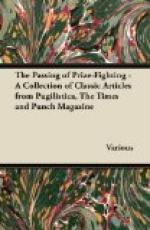No one was more delighted at Mr. BONAR LAW’S announcement of the capture of Baghdad than the Member for Cockermouth, who knows the region well. Mesopotamia may or may not be the Garden of Eden, but Baghdad was at one time unquestionably the abode of BLISS.
Mr. CATHCART WASON was a little puzzled when Mr. FORSTER informed him that the peeling of potatoes by Army cooks is strictly forbidden, “except when the dietary of the troops makes it necessary.” Why should there be any exception at all, he wondered, until a neighbour, better informed about the new meat-ration, whispered, “Sausages and mashed.”
A grave statement by Mr. MACPHERSON as to the recent losses of the Royal Flying Corps on the Western Front, and the increased activity of the German airmen, created some natural depression, which might have been more pronounced had not Mr. PEMBERTON-BILLING seized the occasion to reiterate his charges of “Murder” already condemned as baseless by two judicial tribunals. The House will do anything in reason, but it refuses to accompany Mr. BILLING in his flights of imagination.
Tuesday, March 13th.—In the Lords, the Bill to deprive enemy peers of their titles was supported by Lord MIDLETON, who nobly offered to sacrifice his Red Eagle on the altar of patriotism. On the other hand Lord COURTNEY condemned it; but there is no truth in the story that the Yellow Waistcoat which he habitually wears was originally conferred upon him by the KAISER. It is, I understand, an example of protective colouring, designed to ward off the attacks of the Yellow Press.
Wednesday, March 14th.—The explosive qualities of cotton when suitably combined with other ingredients are well known. Of these ingredients the Lancashire spirit is perhaps the most potent. Mr. AUSTEN CHAMBERLAIN began his defence of the proposed Indian cotton duties with an appeal to Imperial sentiment based upon what India had done and was doing. The Maharajah of BIKANIR, seated in the Distinguished Strangers’ Gallery, listened with appreciation to the praises of his famous Camel Corps. Then followed what might be called the Home Rule argument—we could not refuse what the Indian people so much desired—delivered with so much earnestness that Mr. JEREMIAH MACVEAGH loudly invited Mr. CHAMBERLAIN to “come over and sit on these benches.”
[Illustration: MEGAPHONES FOR MINISTERS. A SUGGESTION FROM THE PRESS GALLERY.]
But his best card was his last, when, after a tribute to Mr. ASQUITH’S “loyalty to colleagues,” which roused tremendous cheering from the Liberals, he invited the late Prime Minister to cast his vote with the Government. Mr. ASQUITH did even more, for at the end of a speech, critical but not censorious, he suggested an amendment to the Resolution which enabled his Free Trade followers to “save their face.” A few stalwarts from Lancashire insisted none the less on taking a division, and were joined on general principles by the Nationalists and other habitual malcontents. But India, the Government and Mr. ASQUITH had the comfortable majority of 140.




